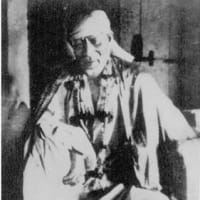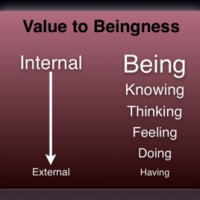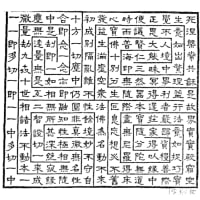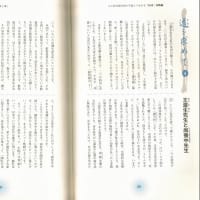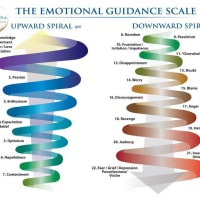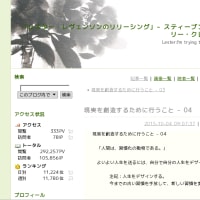Bernadette Roberts (バーナデット・ロバーツ) 1931~ (06 - 3 - 3)
Awakening to Reality: Bernadette Roberts Interview
現実に起きること:
バーナデット・ロバーツ・インタビュー
Bernadette Roberts Interview
Posted by: Wei Yu
Jul 04 2007
前の内容:
Bernadette Roberts (バーナデット・ロバーツ) 1931~ (06 - 1)
2013-06-12 20:51:35 | 話題 (opinion)
Bernadette Roberts (バーナデット・ロバーツ) 1931~ (06 - 2)
2013-06-12 21:41:44 | 話題 (opinion)
Bernadette Roberts (バーナデット・ロバーツ) 1931~ (06 - 3 - 1)
2013-06-12 21:47:44 | 話題 (opinion) 英語のみ
Bernadette Roberts (バーナデット・ロバーツ) 1931~ (06 - 3 - 2)
2013-06-16 02:10:46 | 話題 (opinion)
Stephan: How does the path to no-self in the Christian contemplative tradition differ from the path as laid out in the Hindu and Buddhist traditions?
ステファン:キリスト教の黙思する伝統での無自己へのパスは、どのようにヒンズーと仏教徒の伝統の中にレイアウトされるようなパスと異なりますか?
Bernadette: I think it may be too late for me to ever have a good understanding of how other religions make this passage. If you are not surrendering your whole being, your very consciousness, to a loved and trusted personal God, then what are you surrendering it to? Or why surrender it at all? Loss of ego, loss of self, is just a by-product of this surrender; it is not the true goal, not an end in itself. Perhaps this is also the view of Mahayana Buddhism, where the goal is to save all sentient beings from suffering, and where loss of ego, loss of self, is seen as a means to a greater end. This view is very much in keeping with the Christian desire to save all souls. As I see it, without a personal God, the Buddhist must have a much stronger faith in the "unconditioned and unbegotten" than is required of the Christian contemplative, who experiences the passage as a divine doing, and in no way a self-doing.
バーナデット:私は私が今までに他の宗教は、この通路を作る方法をよく理解してすることが遅すぎるかもしれないと思う。あなたは愛され、信頼された個人的な神への全存在、あなたの非常に意識を、放棄されていない場合は、それを何を放棄している?か、なぜそれを全く放棄する?自我、自己の損失の損失はちょうどこの降伏の副産物である、ではない、それは、それ自体が目的で真の目的ではありません。おそらくこれは、目標は、苦しみからすべての衆生を救うためにある場合、また、大乗仏教の図であり、自我、自己の損失の損失は大きな目的を達成するための手段と見られているところ。このビューには、すべての魂を救うために、キリスト教の願望と調和して非常によく似ています。私は個人的な神なしで、それを見るように、仏教やって神として通過を経験キリスト教瞑想、に要求されるよりも、"無条件かつ独立自存の"ではるかに強い信仰を持っている必要がありますし、決して自己を行う。
Actually, I met up with Buddhism only at the end of my journey, after the no-self experience. Since I knew that this experience was not articulated in our contemplative literature, I went to the library to see if it could be found in the Eastern Religions. It did not take me long to realize that I would not find it in the Hindu tradition, where, as I see it, the final state is equivalent to the Christian experience of oneness or transforming union. If a Hindu had what I call the no-self experience, it would be the sudden, unexpected disappearance of the Atman-Brahman, the divine Self in the "cave of the heart", and the disappearance of the cave as well. It would be the ending of God-consciousness, or transcendental consciousness - that seemingly bottomless experience of "being", "consciousness", and "bliss" that articulates the state of oneness. To regard this ending as the falling away of the ego is a grave error; ego must fall away before the state of oneness can be realized. The no-self experience is the falling away of this previously realized transcendent state.
実は、私は無自己経験の後、唯一の私の旅の終わりに仏教に会った。私はこの経験が私たちの瞑想文献に明確されていないことを知っていたので、私はそれは東洋の宗教で見つけることができるかどうかを図書館に行ってきました。それは私がそれを見るように、最終的な状態は一体または変換組合のキリスト教の経験に相当するものであるときは、私はヒンドゥー教の伝統、それを見つけられないであろうことを認識することが、長い私を取ることはありませんでした。ヒンドゥー無自己経験を呼んていた場合、それはアートマン·ブラフマン、"心の洞窟"で神の自己、そして同様に洞窟の消失の突然の、予期せぬ失踪でしょう。それは神の意識、または超越意識の結末だろう - の一見底なしの経験が"である"ことを、"意識"、そしてワンネスの状態を明確に表現すること"至福"。落下離れて自我のようなこの結末を考えるためには重大な誤りであり、ワンネスの状態を実現することができる前に、自我は車で収まっている必要があります。非自己の経験はこの先に実現超越状態から離れて落ちている。
Initially, when I looked into Buddhism, I did not find the experience of no-self there either; yet I intuited that it had to be there. The falling away of the ego is common to both Hinduism and Buddhism. Therefore, it would not account for the fact that Buddhism became a separate religion, nor would it account for the Buddhist's insistence on no eternal Self - be it divine, individual or the two in one. I felt that the key difference between these two religions was the no-self experience, the falling away of the true Self, Atman-Brahman. Unfortunately, what most Buddhist authors define as the no-self experience is actually the no-ego experience.
The cessation of clinging, craving, desire, the passions, etc., and the ensuing state of imperturbable peace and joy articulates the egoless state of oneness; it does not, however, articulate the no-self experience or the dimension beyond.
Unless we clearly distinguish between these two very different experiences, we only confuse them, with the inevitable result that the true no-self experience becomes lost.
If we think the falling away of the ego, with its ensuing transformation and oneness, is the no-self experience, then what shall we call the much further experience when this egoless oneness falls away?
In actual experience there is only one thing to call it, the "no-self experience"; it lends itself to no other possible articulation.
当初、私は仏教に見たとき、私はどちらかが存在しない自己の経験を見つけられませんでした、まだ私はそれが存在しなければならなかったことを直感。自我を離れて落下するとヒンドゥー教と仏教の両方に共通です。したがって、仏教が別の宗教になったという事実を説明できないであろう、また、それは永遠の自己に仏教の主張を占めるであろう - それは、神の個人または1つで2つのこと。私はこれらの2つの宗教の重要な違いは、真の自己の無自己経験、落下離れて、アートマン·ブラフマンと感じました。残念なことに、どのようなほとんどの仏教の著者は、無自己経験として定義すると、実際に、無自我経験です。
しがみついて、渇望、欲望の停止は、情熱などと動じない平和と喜びのその後の状態は、ワンネスの状態を明確に表現egoless、それは、しかし、自己の経験や超えた次元を明確にしていません。
もし明白にこれらの非常に異なる2つの経験を識別しなければ、私たちは単にそれらを避けられなく混同するので、真実の無自己経験は、失われるようになります。
自我の落ちることが、その引き続いて起こる変化と一致で、無自己経験であると我々が思うならば、この自我のない一致が落ちるとき、それから、我々は何を非常に更なる経験と言いますか?
実際の経験において、それ(「無自己経験」)を呼ぶ1つのものだけが、あります;
それは、他のいかなるありうる発音にも向きません。
Initially, I gave up looking for this experience in the Buddhist literature.
Four years later, however, I came across two lines attributed to Buddha describing his enlightenment experience.
Referring to self as a house, he said, "All thy rafters are broken now, the ridgepole is destroyed."
And there it was - the disappearance of the center, the ridgepole; without it, there can be no house, no self.
When I read these lines, it was as if an arrow launched at the beginning of time had suddenly hit a bulls-eye. It was a remarkable find.
These lines are not a piece of philosophy, but an experiential account, and without the experiential account we really have nothing to go on.
In the same verse he says, "Again a house thou shall not build," clearly distinguishing this experience from the falling away of the ego-center, after which a new, transformed self is built around a "true center," a sturdy, balanced ridgepole.
当初、私は仏教の文献でこの経験を探すことをあきらめた。
四年後、しかし、私は、彼の悟りの経験を記述した仏に起因する二行に出くわした。
自己を家と呼んで、彼は、「汝の垂木はすべて今壊れています。梁材が破壊されます」と言いました。
そしてそれがあった。 - 中心の消失 ; それなしで、全く自己(全く家)はありえない。
(そして、それはそこにありました。 ― センター(梁材)の消失 ― ;
それなしで、家(自己でない)があることができません。)
時間の初めに開始した矢印が、突然雄牛の目を打ったかのように、私はこれらの行を読んだとき、それがあった。それは著しい発見でした。
(それは、注目に値する発見でした。)
これらの行は哲学の一部ですが、経験上のアカウントです。また、経験上のアカウントなしで、私たちには、実際に進むものは何もありません。
(これらの行は哲学でなく、経験の利益です。そして、経験の利益なしで、我々は続く何も本当に持ちません。)
彼が言う同じ韻文(詩)では、「また、住宅汝は、造ってはいけません。そして」、明らかにこの経験と自我-センターの落ちることを区別します、そしてその後、新しい、変わる自身は「本当のセンター」(丈夫な、バランスのよい梁材)のまわりで造られます。
As a Christian, I saw the no-self experience as the true nature of Christ's death, the movement beyond even is oneness with the divine, the movement from God to Godhead.
Though not articulated in contemplative literature, Christ dramatized this experience on the cross for all ages to see and ponder.
Where Buddha described the experience, Christ manifested it without words; yet they both make the same statement and reveal the same truth - that ultimately, eternal life is beyond self or consciousness.
After one has seen it manifested or heard it said, the only thing left is to experience it.
クリスチャンとして、私は、キリストの死の本質として、無自己の経験を見て、超えた動きがあっても神の、神から神格への移動と一体である。
(キリスト教徒として、私は無自己経験をキリストの死の本当の性質とみなしました。運動は向こうに神(神から神格への移動)と一緒の一致でさえあります。)
黙思する文学の中で明瞭に表現されませんでしたが、キリストは、時代がすべて見て熟考するために十字架の上で(クロスに関する)この経験を脚色しました。
(瞑想文献に明確ではないけれども、キリストが見て熟考するすべての年齢のために十字架の上でこの経験を脚色しました。)
仏(ブッダ)が経験について記述したところで、キリストは言葉なしでそれを明示しました;
しかし、それらは同じステートメント(声明)をし、同じ真実を明らかにします。- それほど結局、永遠の生命は自己または意識を超えています。
人がそれが明らかにされるのを見たか、それが言われるのを聞いたあと、残った唯一のものはそれを経験することです。
(人が、それが明示されたのを見たか、それが言われたのを聞いた後、残されたただ一つのことはそれを経験することです。)
Stephan: You mention in The Path to No-Self that the unitive state is the "true state in which God intended every person to live his mature years."
Yet so few of us ever achieve this unitive state.
What is it about the way we live right now that prevents us from doing so?
Do you think it is our preoccupation with material success, technology, and personal accomplishment?
ステファン:あなたは、結合力のある状態が「神がすべての人に彼の成熟した年を実践させるつもりだった、真実の状態」であると無自己へのパスの中で言います。
それでも、そう、我々の少数しか、この結合的な状態を決して成し遂げません。
(しかし、私たちのそれほどほとんどは、常にこの結合力のある状態を達成しません。)
それは、私たちが今ちょうど生きている方法のまわりに私たちがそうするのを妨げるものですか?
(それが我々がそうするのを防ぐ今、我々が正しく生きる方法についてのそれは何ですか?)
それは物質的な成功、技術、個人の成果と私たちの最大の関心事だと思いますか?
Bernadette: First of all, I think there are more people in the state of oneness than we realize.
For everyone we hear about there are thousands we will never hear about.
Believing this state to be a rare achievement can be an impediment in itself.
Unfortunately, those who write about it have a way of making it sound more extraordinary and blissful that it commonly is, and so false expectations are another impediment - we keep waiting and looking for an experience or state that never comes.
But if I had to put my finger on the primary obstacle, I would say it is having wrong views of the journey.
バーナデット:まず第一に、私たちは実感よりワンネスの状態でより多くの人々があると思います。
(まず第一に、私は、我々がわかるより多くの人々が単一性の状態にいると思います。)
我々がその辺で話を聞く誰にとってでも、我々が決して聞かされない数千は、あります。。
この状態がまれな業績であると思っていることは、本来障害でありえます。
(この状態がまれな業績であると考えることは、それ自体で妨害かもしれません。)
不運にも、それについて書く人々は、一般にそれがそうであるそれにより異常で、より至極至幸に思えさせる方法を持っています。また、非常に誤りの期待は別の妨害です。私たちは待機および経験を捜すことを維持するか、あるいはそれが来ないと述べます。
(残念なことに、それについて書く人々にはそれが一般にそうであることを深くより驚異的で至福にする方法があります、そして、間違った予想はもう一つの障害です - 我々は待って、決して来ない経験または状態を探し続けます。)
しかし、もし主要な障害を的確に指摘しなければならなければ、私はそれが旅行についての間違った見方(見解)を持っていると言うでしょう。
Paradoxical though it may seem, the passage through consciousness or self moves contrary to self, rubs it the wrong way - and in the end, will even rub it out.
Because this passage goes against the grain of self, it is, therefore, a path of suffering.
Both Christ and Buddha saw the passage as one of suffering, and basically found identical ways out.
What they discovered and revealed to us was that each of us has within himself or herself a "stillpoint" - comparable, perhaps to the eye of a cyclone, a spot or center of calm, imperturbability, and non-movement.
Buddha articulated this central eye in negative terms as "emptiness" or "void", a refuge from the swirling cyclone of endless suffering.
Christ articulated the eye in more positive terms as the "Kingdom of God" or the "Spirit within", a place of refuge and salvation from a suffering self.
それは、逆説的に見えるかもしれませんが、、自己に反した意識または自己の動きによる通過は、それを間違った方法で摩擦します。 - そして結局、それをさらにすり消すでしょう。
この通過が自身の性格に反するので、それは、したがって、苦しみの通り道です。
キリストと仏陀の両方が苦しみの一つとして通過を見て、基本的に同一の方法を見つけました。
(キリストとブッダは、通過を苦しむ1つとみなして、基本的に同一の方法がわかりました。)
それらが私たちに発見し明らかにしたことは、自分または自分内に私たち各自が「stillpoint(still point:静かな点)」(恐らくサイクロン、平静のスポットか、中心、imperturbability(不動心:冷静で乱されない自信)および非移動の目に匹敵する)を持っているということでした。
(恐らくサイクロン、スポットまたは穏やかの中心、泰然自若、非運動の目に匹敵する、 - 彼らは何を発見し、私たちに明らかにすることは、私たち一人ひとりが自分の"静止点"を自分自身の中に持っているかということでした。)
ブッダは、「空虚」または「空所」(終りのない苦しみの渦巻くサイクロンからの避難所)として否定的な語でこの中心目を明瞭に表現しました。
(仏は「空虚」または 「無効」として、無限の苦しみの渦巻くサイクロンから避難所として負の面でこの中央の目を明確に表現しました。)
キリストは「神の王国」や「精神の内に(勇気)」として、苦しみ自己(苦しんでいる自身)から避難と救いの場として、より積極的用語(ポジティブな語)で目を明確に表現しました。
For both of them, the easy out was first to find that stillpoint and then, by attaching ourselves to it, by becoming one with it, to find a stabilizing, balanced anchor in our lives.
After that, the cyclone is gradually drawn into the eye, and the suffering self comes to an end.
And when there is no longer a cyclone, there is also no longer an eye.
So the storms, crises, and sufferings of life are a way of finding the eye.
When everything is going our way, we do not see the eye, and we feel no need to find it.
But when everything is going against us, then we find the eye.
So the avoidance of suffering and the desire to have everything go our own way runs contrary to the whole movement of our journey; it is all a wrong view.
With the right view, however, one should be able to come to the state of oneness in six or seven years - years not merely of suffering, but years of enlightenment, for right suffering is the essence of enlightenment.
Because self is everyone's experience underlying all culture.
I do not regard cultural wrong views as an excuse for not searching out right views.
After all, each person's passage is his or her own; there is no such thing as a collective passage.
それらの両方のために、簡単に外には、その静止点を見つけることが第一号だった、その後、それに自分自身を添付し、私たちの生活の中で安定、バランスのとれたアンカーを見つけるには、それとの1になることで。
その後、サイクロン(回転させたりぐるぐる動かすこと、滞在することや住むことを表す)は目に徐々に引き入れられます、そして、苦しんでいる自身は終わります。
そして、もはやサイクロン(回転させたりぐるぐる動かすこと、滞在することや住むことを表す)がないとき、もはや目もありません。
したがって、人生の嵐、危機および苦痛は目を見つける方法です。
すべてが我々の道を行っているとき、我々は目を見ません、そして、我々はそれを見つける必要を感じません。
しかし、すべてが我々に反しているとき、それから、我々は目を見つけます。
(しかし、すべてが私たちに逆らっている場合、その後、私たちは目を見つけます。)
苦しむ回避とすべてを持ちたいという願望が行くように、自分自身の道は我々の旅行の全部の変化に逆らって走ります;
それは、すべての間違った見解です。
正しい視界(見解)で、しかしながら、人は6年か7年で単一性の状態に来ることができるに違いありません - 単にではなく数年間の苦痛、しかし数年間の啓発、正しい苦痛のために、啓発の本質です。
(しかし、人は6~7年の間に一体感の状態になることができるはずです。)
自己は、すべての文化の根底にあるみんなの経験ですので。
(自身が、すべての文化の基礎をなしているみんなの経験であるので。)
私は、文化的な間違った見解を健全な見解を求めないことの言い訳と考えません。
結局、各々の人の通路は、自分のものです;
総体的な通路なんてものが、ありません。
(結局、各人の通行は自分自身のものです;
集合的な通行のようなものはありません。)
Awakening to Reality: Bernadette Roberts Interview
現実に起きること:
バーナデット・ロバーツ・インタビュー
Bernadette Roberts Interview
Posted by: Wei Yu
Jul 04 2007
前の内容:
Bernadette Roberts (バーナデット・ロバーツ) 1931~ (06 - 1)
2013-06-12 20:51:35 | 話題 (opinion)
Bernadette Roberts (バーナデット・ロバーツ) 1931~ (06 - 2)
2013-06-12 21:41:44 | 話題 (opinion)
Bernadette Roberts (バーナデット・ロバーツ) 1931~ (06 - 3 - 1)
2013-06-12 21:47:44 | 話題 (opinion) 英語のみ
Bernadette Roberts (バーナデット・ロバーツ) 1931~ (06 - 3 - 2)
2013-06-16 02:10:46 | 話題 (opinion)
Stephan: How does the path to no-self in the Christian contemplative tradition differ from the path as laid out in the Hindu and Buddhist traditions?
ステファン:キリスト教の黙思する伝統での無自己へのパスは、どのようにヒンズーと仏教徒の伝統の中にレイアウトされるようなパスと異なりますか?
Bernadette: I think it may be too late for me to ever have a good understanding of how other religions make this passage. If you are not surrendering your whole being, your very consciousness, to a loved and trusted personal God, then what are you surrendering it to? Or why surrender it at all? Loss of ego, loss of self, is just a by-product of this surrender; it is not the true goal, not an end in itself. Perhaps this is also the view of Mahayana Buddhism, where the goal is to save all sentient beings from suffering, and where loss of ego, loss of self, is seen as a means to a greater end. This view is very much in keeping with the Christian desire to save all souls. As I see it, without a personal God, the Buddhist must have a much stronger faith in the "unconditioned and unbegotten" than is required of the Christian contemplative, who experiences the passage as a divine doing, and in no way a self-doing.
バーナデット:私は私が今までに他の宗教は、この通路を作る方法をよく理解してすることが遅すぎるかもしれないと思う。あなたは愛され、信頼された個人的な神への全存在、あなたの非常に意識を、放棄されていない場合は、それを何を放棄している?か、なぜそれを全く放棄する?自我、自己の損失の損失はちょうどこの降伏の副産物である、ではない、それは、それ自体が目的で真の目的ではありません。おそらくこれは、目標は、苦しみからすべての衆生を救うためにある場合、また、大乗仏教の図であり、自我、自己の損失の損失は大きな目的を達成するための手段と見られているところ。このビューには、すべての魂を救うために、キリスト教の願望と調和して非常によく似ています。私は個人的な神なしで、それを見るように、仏教やって神として通過を経験キリスト教瞑想、に要求されるよりも、"無条件かつ独立自存の"ではるかに強い信仰を持っている必要がありますし、決して自己を行う。
Actually, I met up with Buddhism only at the end of my journey, after the no-self experience. Since I knew that this experience was not articulated in our contemplative literature, I went to the library to see if it could be found in the Eastern Religions. It did not take me long to realize that I would not find it in the Hindu tradition, where, as I see it, the final state is equivalent to the Christian experience of oneness or transforming union. If a Hindu had what I call the no-self experience, it would be the sudden, unexpected disappearance of the Atman-Brahman, the divine Self in the "cave of the heart", and the disappearance of the cave as well. It would be the ending of God-consciousness, or transcendental consciousness - that seemingly bottomless experience of "being", "consciousness", and "bliss" that articulates the state of oneness. To regard this ending as the falling away of the ego is a grave error; ego must fall away before the state of oneness can be realized. The no-self experience is the falling away of this previously realized transcendent state.
実は、私は無自己経験の後、唯一の私の旅の終わりに仏教に会った。私はこの経験が私たちの瞑想文献に明確されていないことを知っていたので、私はそれは東洋の宗教で見つけることができるかどうかを図書館に行ってきました。それは私がそれを見るように、最終的な状態は一体または変換組合のキリスト教の経験に相当するものであるときは、私はヒンドゥー教の伝統、それを見つけられないであろうことを認識することが、長い私を取ることはありませんでした。ヒンドゥー無自己経験を呼んていた場合、それはアートマン·ブラフマン、"心の洞窟"で神の自己、そして同様に洞窟の消失の突然の、予期せぬ失踪でしょう。それは神の意識、または超越意識の結末だろう - の一見底なしの経験が"である"ことを、"意識"、そしてワンネスの状態を明確に表現すること"至福"。落下離れて自我のようなこの結末を考えるためには重大な誤りであり、ワンネスの状態を実現することができる前に、自我は車で収まっている必要があります。非自己の経験はこの先に実現超越状態から離れて落ちている。
Initially, when I looked into Buddhism, I did not find the experience of no-self there either; yet I intuited that it had to be there. The falling away of the ego is common to both Hinduism and Buddhism. Therefore, it would not account for the fact that Buddhism became a separate religion, nor would it account for the Buddhist's insistence on no eternal Self - be it divine, individual or the two in one. I felt that the key difference between these two religions was the no-self experience, the falling away of the true Self, Atman-Brahman. Unfortunately, what most Buddhist authors define as the no-self experience is actually the no-ego experience.
The cessation of clinging, craving, desire, the passions, etc., and the ensuing state of imperturbable peace and joy articulates the egoless state of oneness; it does not, however, articulate the no-self experience or the dimension beyond.
Unless we clearly distinguish between these two very different experiences, we only confuse them, with the inevitable result that the true no-self experience becomes lost.
If we think the falling away of the ego, with its ensuing transformation and oneness, is the no-self experience, then what shall we call the much further experience when this egoless oneness falls away?
In actual experience there is only one thing to call it, the "no-self experience"; it lends itself to no other possible articulation.
当初、私は仏教に見たとき、私はどちらかが存在しない自己の経験を見つけられませんでした、まだ私はそれが存在しなければならなかったことを直感。自我を離れて落下するとヒンドゥー教と仏教の両方に共通です。したがって、仏教が別の宗教になったという事実を説明できないであろう、また、それは永遠の自己に仏教の主張を占めるであろう - それは、神の個人または1つで2つのこと。私はこれらの2つの宗教の重要な違いは、真の自己の無自己経験、落下離れて、アートマン·ブラフマンと感じました。残念なことに、どのようなほとんどの仏教の著者は、無自己経験として定義すると、実際に、無自我経験です。
しがみついて、渇望、欲望の停止は、情熱などと動じない平和と喜びのその後の状態は、ワンネスの状態を明確に表現egoless、それは、しかし、自己の経験や超えた次元を明確にしていません。
もし明白にこれらの非常に異なる2つの経験を識別しなければ、私たちは単にそれらを避けられなく混同するので、真実の無自己経験は、失われるようになります。
自我の落ちることが、その引き続いて起こる変化と一致で、無自己経験であると我々が思うならば、この自我のない一致が落ちるとき、それから、我々は何を非常に更なる経験と言いますか?
実際の経験において、それ(「無自己経験」)を呼ぶ1つのものだけが、あります;
それは、他のいかなるありうる発音にも向きません。
Initially, I gave up looking for this experience in the Buddhist literature.
Four years later, however, I came across two lines attributed to Buddha describing his enlightenment experience.
Referring to self as a house, he said, "All thy rafters are broken now, the ridgepole is destroyed."
And there it was - the disappearance of the center, the ridgepole; without it, there can be no house, no self.
When I read these lines, it was as if an arrow launched at the beginning of time had suddenly hit a bulls-eye. It was a remarkable find.
These lines are not a piece of philosophy, but an experiential account, and without the experiential account we really have nothing to go on.
In the same verse he says, "Again a house thou shall not build," clearly distinguishing this experience from the falling away of the ego-center, after which a new, transformed self is built around a "true center," a sturdy, balanced ridgepole.
当初、私は仏教の文献でこの経験を探すことをあきらめた。
四年後、しかし、私は、彼の悟りの経験を記述した仏に起因する二行に出くわした。
自己を家と呼んで、彼は、「汝の垂木はすべて今壊れています。梁材が破壊されます」と言いました。
そしてそれがあった。 - 中心の消失 ; それなしで、全く自己(全く家)はありえない。
(そして、それはそこにありました。 ― センター(梁材)の消失 ― ;
それなしで、家(自己でない)があることができません。)
時間の初めに開始した矢印が、突然雄牛の目を打ったかのように、私はこれらの行を読んだとき、それがあった。それは著しい発見でした。
(それは、注目に値する発見でした。)
これらの行は哲学の一部ですが、経験上のアカウントです。また、経験上のアカウントなしで、私たちには、実際に進むものは何もありません。
(これらの行は哲学でなく、経験の利益です。そして、経験の利益なしで、我々は続く何も本当に持ちません。)
彼が言う同じ韻文(詩)では、「また、住宅汝は、造ってはいけません。そして」、明らかにこの経験と自我-センターの落ちることを区別します、そしてその後、新しい、変わる自身は「本当のセンター」(丈夫な、バランスのよい梁材)のまわりで造られます。
As a Christian, I saw the no-self experience as the true nature of Christ's death, the movement beyond even is oneness with the divine, the movement from God to Godhead.
Though not articulated in contemplative literature, Christ dramatized this experience on the cross for all ages to see and ponder.
Where Buddha described the experience, Christ manifested it without words; yet they both make the same statement and reveal the same truth - that ultimately, eternal life is beyond self or consciousness.
After one has seen it manifested or heard it said, the only thing left is to experience it.
クリスチャンとして、私は、キリストの死の本質として、無自己の経験を見て、超えた動きがあっても神の、神から神格への移動と一体である。
(キリスト教徒として、私は無自己経験をキリストの死の本当の性質とみなしました。運動は向こうに神(神から神格への移動)と一緒の一致でさえあります。)
黙思する文学の中で明瞭に表現されませんでしたが、キリストは、時代がすべて見て熟考するために十字架の上で(クロスに関する)この経験を脚色しました。
(瞑想文献に明確ではないけれども、キリストが見て熟考するすべての年齢のために十字架の上でこの経験を脚色しました。)
仏(ブッダ)が経験について記述したところで、キリストは言葉なしでそれを明示しました;
しかし、それらは同じステートメント(声明)をし、同じ真実を明らかにします。- それほど結局、永遠の生命は自己または意識を超えています。
人がそれが明らかにされるのを見たか、それが言われるのを聞いたあと、残った唯一のものはそれを経験することです。
(人が、それが明示されたのを見たか、それが言われたのを聞いた後、残されたただ一つのことはそれを経験することです。)
Stephan: You mention in The Path to No-Self that the unitive state is the "true state in which God intended every person to live his mature years."
Yet so few of us ever achieve this unitive state.
What is it about the way we live right now that prevents us from doing so?
Do you think it is our preoccupation with material success, technology, and personal accomplishment?
ステファン:あなたは、結合力のある状態が「神がすべての人に彼の成熟した年を実践させるつもりだった、真実の状態」であると無自己へのパスの中で言います。
それでも、そう、我々の少数しか、この結合的な状態を決して成し遂げません。
(しかし、私たちのそれほどほとんどは、常にこの結合力のある状態を達成しません。)
それは、私たちが今ちょうど生きている方法のまわりに私たちがそうするのを妨げるものですか?
(それが我々がそうするのを防ぐ今、我々が正しく生きる方法についてのそれは何ですか?)
それは物質的な成功、技術、個人の成果と私たちの最大の関心事だと思いますか?
Bernadette: First of all, I think there are more people in the state of oneness than we realize.
For everyone we hear about there are thousands we will never hear about.
Believing this state to be a rare achievement can be an impediment in itself.
Unfortunately, those who write about it have a way of making it sound more extraordinary and blissful that it commonly is, and so false expectations are another impediment - we keep waiting and looking for an experience or state that never comes.
But if I had to put my finger on the primary obstacle, I would say it is having wrong views of the journey.
バーナデット:まず第一に、私たちは実感よりワンネスの状態でより多くの人々があると思います。
(まず第一に、私は、我々がわかるより多くの人々が単一性の状態にいると思います。)
我々がその辺で話を聞く誰にとってでも、我々が決して聞かされない数千は、あります。。
この状態がまれな業績であると思っていることは、本来障害でありえます。
(この状態がまれな業績であると考えることは、それ自体で妨害かもしれません。)
不運にも、それについて書く人々は、一般にそれがそうであるそれにより異常で、より至極至幸に思えさせる方法を持っています。また、非常に誤りの期待は別の妨害です。私たちは待機および経験を捜すことを維持するか、あるいはそれが来ないと述べます。
(残念なことに、それについて書く人々にはそれが一般にそうであることを深くより驚異的で至福にする方法があります、そして、間違った予想はもう一つの障害です - 我々は待って、決して来ない経験または状態を探し続けます。)
しかし、もし主要な障害を的確に指摘しなければならなければ、私はそれが旅行についての間違った見方(見解)を持っていると言うでしょう。
Paradoxical though it may seem, the passage through consciousness or self moves contrary to self, rubs it the wrong way - and in the end, will even rub it out.
Because this passage goes against the grain of self, it is, therefore, a path of suffering.
Both Christ and Buddha saw the passage as one of suffering, and basically found identical ways out.
What they discovered and revealed to us was that each of us has within himself or herself a "stillpoint" - comparable, perhaps to the eye of a cyclone, a spot or center of calm, imperturbability, and non-movement.
Buddha articulated this central eye in negative terms as "emptiness" or "void", a refuge from the swirling cyclone of endless suffering.
Christ articulated the eye in more positive terms as the "Kingdom of God" or the "Spirit within", a place of refuge and salvation from a suffering self.
それは、逆説的に見えるかもしれませんが、、自己に反した意識または自己の動きによる通過は、それを間違った方法で摩擦します。 - そして結局、それをさらにすり消すでしょう。
この通過が自身の性格に反するので、それは、したがって、苦しみの通り道です。
キリストと仏陀の両方が苦しみの一つとして通過を見て、基本的に同一の方法を見つけました。
(キリストとブッダは、通過を苦しむ1つとみなして、基本的に同一の方法がわかりました。)
それらが私たちに発見し明らかにしたことは、自分または自分内に私たち各自が「stillpoint(still point:静かな点)」(恐らくサイクロン、平静のスポットか、中心、imperturbability(不動心:冷静で乱されない自信)および非移動の目に匹敵する)を持っているということでした。
(恐らくサイクロン、スポットまたは穏やかの中心、泰然自若、非運動の目に匹敵する、 - 彼らは何を発見し、私たちに明らかにすることは、私たち一人ひとりが自分の"静止点"を自分自身の中に持っているかということでした。)
ブッダは、「空虚」または「空所」(終りのない苦しみの渦巻くサイクロンからの避難所)として否定的な語でこの中心目を明瞭に表現しました。
(仏は「空虚」または 「無効」として、無限の苦しみの渦巻くサイクロンから避難所として負の面でこの中央の目を明確に表現しました。)
キリストは「神の王国」や「精神の内に(勇気)」として、苦しみ自己(苦しんでいる自身)から避難と救いの場として、より積極的用語(ポジティブな語)で目を明確に表現しました。
For both of them, the easy out was first to find that stillpoint and then, by attaching ourselves to it, by becoming one with it, to find a stabilizing, balanced anchor in our lives.
After that, the cyclone is gradually drawn into the eye, and the suffering self comes to an end.
And when there is no longer a cyclone, there is also no longer an eye.
So the storms, crises, and sufferings of life are a way of finding the eye.
When everything is going our way, we do not see the eye, and we feel no need to find it.
But when everything is going against us, then we find the eye.
So the avoidance of suffering and the desire to have everything go our own way runs contrary to the whole movement of our journey; it is all a wrong view.
With the right view, however, one should be able to come to the state of oneness in six or seven years - years not merely of suffering, but years of enlightenment, for right suffering is the essence of enlightenment.
Because self is everyone's experience underlying all culture.
I do not regard cultural wrong views as an excuse for not searching out right views.
After all, each person's passage is his or her own; there is no such thing as a collective passage.
それらの両方のために、簡単に外には、その静止点を見つけることが第一号だった、その後、それに自分自身を添付し、私たちの生活の中で安定、バランスのとれたアンカーを見つけるには、それとの1になることで。
その後、サイクロン(回転させたりぐるぐる動かすこと、滞在することや住むことを表す)は目に徐々に引き入れられます、そして、苦しんでいる自身は終わります。
そして、もはやサイクロン(回転させたりぐるぐる動かすこと、滞在することや住むことを表す)がないとき、もはや目もありません。
したがって、人生の嵐、危機および苦痛は目を見つける方法です。
すべてが我々の道を行っているとき、我々は目を見ません、そして、我々はそれを見つける必要を感じません。
しかし、すべてが我々に反しているとき、それから、我々は目を見つけます。
(しかし、すべてが私たちに逆らっている場合、その後、私たちは目を見つけます。)
苦しむ回避とすべてを持ちたいという願望が行くように、自分自身の道は我々の旅行の全部の変化に逆らって走ります;
それは、すべての間違った見解です。
正しい視界(見解)で、しかしながら、人は6年か7年で単一性の状態に来ることができるに違いありません - 単にではなく数年間の苦痛、しかし数年間の啓発、正しい苦痛のために、啓発の本質です。
(しかし、人は6~7年の間に一体感の状態になることができるはずです。)
自己は、すべての文化の根底にあるみんなの経験ですので。
(自身が、すべての文化の基礎をなしているみんなの経験であるので。)
私は、文化的な間違った見解を健全な見解を求めないことの言い訳と考えません。
結局、各々の人の通路は、自分のものです;
総体的な通路なんてものが、ありません。
(結局、各人の通行は自分自身のものです;
集合的な通行のようなものはありません。)










